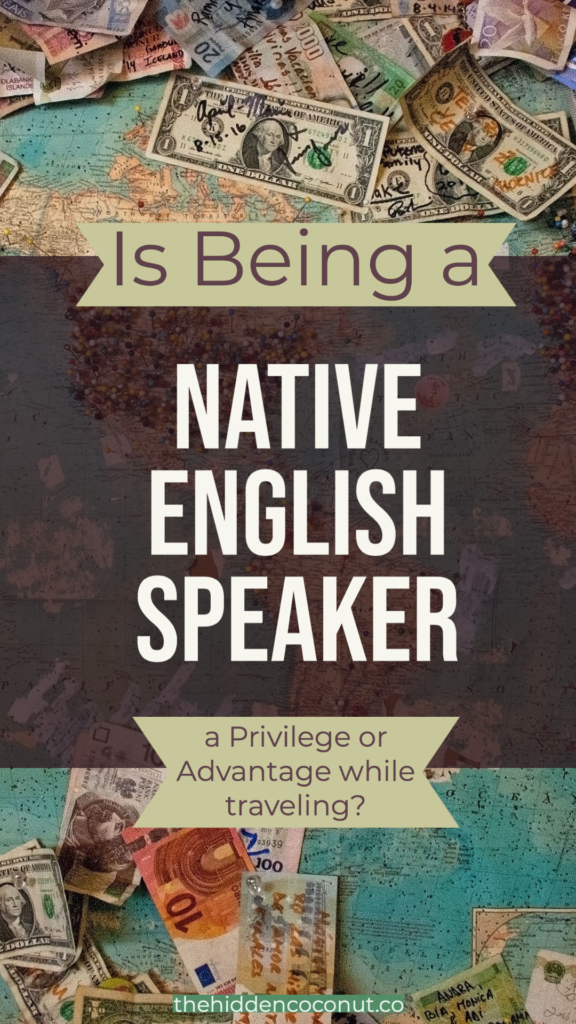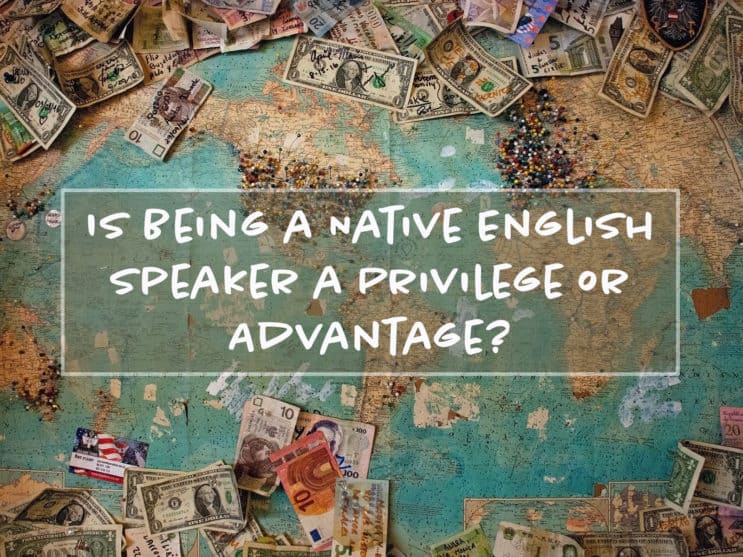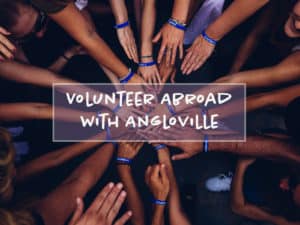Native English speakers predominantly grow up learning only one language, English. English is known for being a language that brings people together or lingua franca. It the language of science and medicine.
Billions of people study English every year to improve their job prospects, study abroad, travel, and communicate with others.
As native English speakers, sometimes we take for granted that we already know the language that many others are trying so hard to learn. We can communicate with non-English speakers in broken English or pictures or gestures. And if all else fails, there’s always Google Translate at the touch of our fingers.
So what does it mean to be privileged while traveling as a native English speaker?
Only Know One Language
Each language has its own quirks and parts of speech or an accent that only people native to that language can pick up. It can be difficult for your “native English” personality to come through in a different language.
That might be because of a lack of vocabulary or your sense of humor can be taken differently in another language or culture. You might be worried that you won’t be able to properly pronounce words making what you want to say, sound completely different. Take sarcasm in English. Is it going to come off the same in another language?
If you’re able to strike up a conversation with a local in another country, they will appreciate the effort, but they will ask you if they can practice speaking English with you. Thus, eliminating any chance you had to practice a second language.
This situation comes up quite often and the excitement of a local meeting someone who is a native English speaker is always fun for them. You are seen as someone they can practice with for free.
Assume There is Always Someone Else That Speaks English
Your chances of running into another English speaker around the globe are pretty high, but that doesn’t mean it should be taken for granted. If you’re wanting to immerse yourself in the culture, a local guide is going to speak to you in English to tell you about their country. This person learned a second language to be able to communicate with you. Just take a second to appreciate all the hours they practiced to be able to communicate in English, with you.
Before entering this country, did you learn to say anything in the local language? Are you able to explain your country in a second language?
You might have learned how to say hello or thank you in a new language, but after you left that country, you probably forgot those words.
I know that sometimes I feel like what’s the point of learning another language when I already know English. There are other people around the world that learned English, but it just sounds so selfish to only speak one language.
There is a Whole Industry Dedicated to Teaching English Abroad
No other language has international programs to bring native speakers to another country to teach and share their language. Teaching English abroad is a $63 billion industry with 100,000 new job postings every year. And the most desired people for these jobs are native English speakers.
There are actually more people that speak Mandarin or Spanish than there are native people that speak English. However, it is English that they want their children to learn.
We are globally connected more than ever due to the internet, which by the way, 55% of all web content is in English. It is the language of international business, travel, medicine, technology, innovation, and science. English is a rapidly sought after language to learn all over the world.
I would be wrong to say that being able to teach abroad is not a privilege, because it is. It goes along with passport privilege — that’s another topic. The industry of teaching English abroad has grown tremendously over the last 5-10 years. The demand to learn English globally has risen. Online companies have popped up, catering to native English speakers to work from home and teach English. No other language compares to the speed and growth of learning English.
Scared of Being in a Place that has a Lack of English
Personally, I like being in a place where few people speak my language. I think it’s a more genuine experience. Yes, it can be frustrating sometimes because you can’t read anything or communicate openly with someone.
But those frustrations lead to you growing as a person and figuring out how to survive without English. And just so you know, it can be done! There is no need to raise your voice or cause a scene because you don’t understand something. Remember, you are in their country. So if they are speaking to you in Italian while you’re in Italy, it is not their fault.
English is in many places, but it is not everywhere. It is not a worldwide universal language that everyone knows. Speaking from an American perspective, I think there are quite a few Americans that find it scary to be in a place where there is a lack of English. Less than half of the American population even has a passport. This can be for a number of reasons, but I think a lot of Americans are comfortable in America, and being uncomfortable in a country with a lack of English is not appealing for them.

Is it a Privilege or Advantage?
By definition, a privilege is an advantage that you have not chosen for yourself. If we were all able to chose privilege, it wouldn’t exist. Just because you have a certain privilege doesn’t mean you haven’t had any hardships in your life either.
So does being a native English speaker mean you are privileged? In a way, yes. Privilege can be seen in all different types of forms including language, race, gender, economic background, etc. Does it make me a bad person to exploit my native English speaking privilege by teaching abroad? Personally, I don’t think so because many people want to learn English. However, others might disagree because foreign teachers are typically paid more than local teachers.

How Can Native English Speakers Recognize Their Privilege?
I think that acknowledging that another person has learned a second language to be able to better themselves is something to be recognized more often. We also shouldn’t dismiss someone who learned English and is not a native speaker in regards to job prospects or credentials. If someone misuses a verb, it shouldn’t discredit them.
Native English speakers should also be encouraged to learn another language to understand the hard work, practice, and confidence it takes to speak with someones who is fluent in the language you’re learning. Being a teacher, I know that it takes students a lot of confidence to actually use the English they learned. A lot of students are too shy to speak, but are great at reading and writing.
What are some ways that you can better acknowledge language privilege next time you travel?




This is such a thought provoking and interesting post Stefanie. We always try to learn a bit of the language whenever we travel. Just a few phrases to get by. We always find that is really appreciated and we are always impressed by those who are able to speak English as a second language. And we say so! Really enjoyed reading
This is so true, being a native English speaker is such a great thing to have and I don’t think enough people appreciate it as much as they should. The opportunities and easy acces to many things are huge and the effort of others to learn is amazing, I know how hard it is to learn another language, I’m currently trying but struggling! . Great post, thanks for sharing 😊
Chris
Cjattractionsguide.WordPress.com